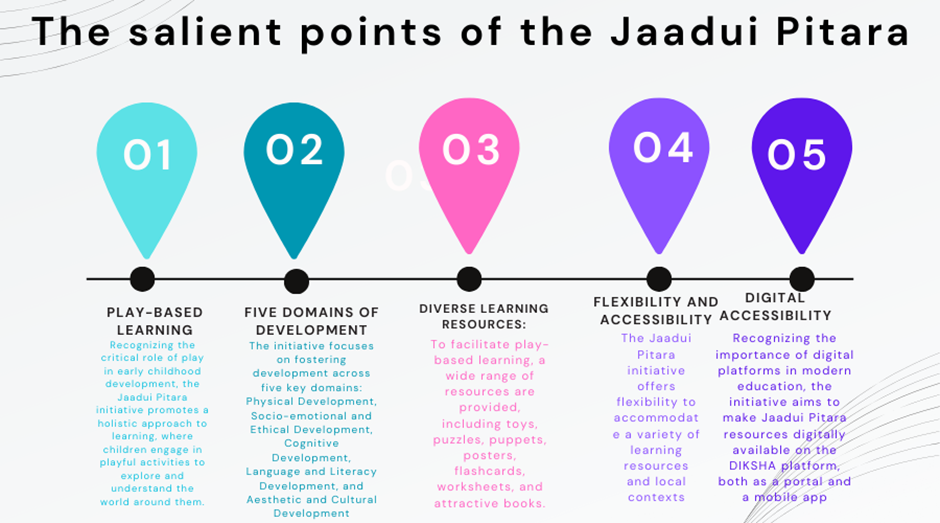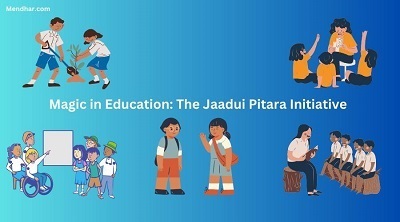Context-
The launch of NCERT's Jaadui Pitara (magic box) in February 2023 marked a significant moment in India's education landscape. Designed to enhance learning through play, this initiative reflects a broader acknowledgment of play as a critical component of childhood development and education. This article explores the multifaceted role of play, the transformative impact of the Jaadui Pitara, and its integration into India's educational framework.
The Unveiling of Jaadui Pitara
During the launch event, children were invited to unveil the Jaadui Pitara. Their reaction was immediate and profound—eyes lighting up as they discovered a treasure trove of toys, books, and learning materials. This moment underscored the innate joy and curiosity that play evokes in children, transcending the formalities of the ceremony and connecting deeply with the audience of educators and administrators present.
The Significance of Play in Child Development
Natural and Holistic Development
Play is not merely recreational; it is a powerful tool for holistic development encompassing physical, socio-emotional, language, cognitive, and cultural aspects. The National Education Policy (NEP) 2020 and the National Curriculum Framework for the Foundational Stage (NCF-FS) 2022 have formally recognized the role of play in early childhood education. The framework emphasizes that children learn best through play, fostering curiosity, exploration, and experimentation in a safe and non-judgmental environment.
International Recognition and Celebrations
The International Day of Play, observed on June 11, highlights the global recognition of play as essential for children's well-being and development. In India, this day resonates with the country's commitment to institutionalizing play-based learning as a cornerstone of early education.
The Role of Jaadui Pitara in Transforming Education

Curriculum Integration and Learning Outcomes
NCERT's Jaadui Pitara serves as a model for educational transformation at the foundational stage (ages 3-8). It includes a diverse array of toys, games, puzzles, puppets, storybooks, and teacher handbooks, each meticulously mapped to specific learning outcomes. This comprehensive approach ensures that play is not just an activity but a structured learning experience aligned with educational goals.
Customization and Localization Efforts
Recognizing India's cultural and linguistic diversity, efforts are underway to customize the Jaadui Pitara's contents to suit local contexts. States are actively adapting the box's materials to reflect regional sensibilities and enhance engagement among children from various backgrounds.
Digital Adaptation: The e-Jaadui Pitara
In response to the digital age, the Ministry of Education launched the e-Jaadui Pitara. This digital counterpart leverages technology to expand accessibility through computers, smartphones, television, and radio. Virtual assistants equipped with generative AI enhance interactive storytelling and engage children in play-learning activities, democratizing access to educational resources across diverse settings.
The Scientific Basis of Play
Cognitive and Neurological Benefits
Scientific studies affirm the profound impact of play on child development. Play stimulates brain development, particularly the prefrontal cortex responsible for attention, problem-solving, and social behavior regulation. Neuroplasticity, the brain's ability to form new neural connections, is heightened during play, facilitating lifelong learning and adaptation.
Intuitive Knowledge and Decision-Making
Play nurtures intuitive knowledge essential for complex problem-solving and decision-making in uncertain conditions. By allowing children to make choices and explore their environment freely, play fosters creativity, resilience, and adaptive skills crucial for navigating diverse challenges.
Parental and Caregiver Roles in Facilitating Play
Foundation for Growth and Development
International agencies like UNICEF underscore the pivotal role of play in early childhood, emphasizing its foundational impact on lifelong growth and development. From infancy onwards, parental engagement in play cultivates curiosity, joy, and social-emotional skills essential for children's overall well-being.
Benefits for Adults: Mental Health and Creativity
Beyond childhood, play continues to benefit adults by enhancing mental health, cognition, and creativity. Parents and caregivers who actively participate in play not only support children's learning but also strengthen familial bonds and promote positive interactions within the community.
Conclusion
NCERT's Jaadui Pitara exemplifies India's commitment to reimagining education through play-based learning. By integrating play into the foundational stage curriculum, India not only enriches educational experiences but also nurtures a generation of creative, resilient, and adaptive individuals. As the world celebrates the transformative power of play, let us embrace its potential to foster holistic development and shape a brighter future for all children.
|
Probable Questions for UPSC Mains Exam-
|
.Source - Indian Express







